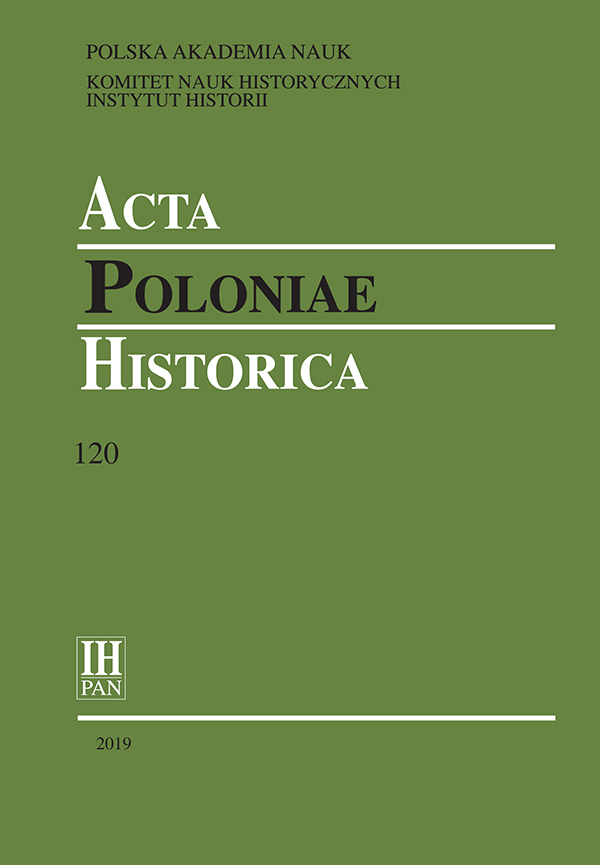The ‘Merchant Schism’ in Breslau: A Chris- tian-Jewish Conflict and the Construction of the Exchange Building in the First Half of the Nineteenth Century
DOI:
https://doi.org/10.12775/APH.2019.120.04Słowa kluczowe
Central Europe, Breslau (Wrocław), Cracow, eighteenth/nineteenth century, Christians, Jews, trade, commerce, merchants, Breslau Exchange, chambers of commerceAbstrakt
This article seeks to interpret the dispute between Christian and Jewish merchants that took place in Breslau (today, Wrocław in Poland) in the first half of the nineteenth century. The dispute arose in the eighteenth century and severely deepened after the reforms designed by Heinrich Friedrich Karl vom und zum Stein and Karl August von Hardenberg were being introduced in Prussia since 1807. Among other aspects, the conflict revolved around the rapid development of the local Jewish religious community and the fast expansion of its steam-gathering economic elite. The development of Silesian trade, with an enormous role of Jews in it, was accompanied by continuous attempts at regaining the Eastern markets, partly lost after Prussia annexed Silesia in 1740 as well as resulting from the decisions of the 1815 Vienna Congress. In order to restore Breslau as an intermediary in trade between the West and the East and make it an important stock-exchange hub, collective action was a must. However, conflicts between merchants of different religions, including keeping the Jewish merchants off the local exchange, obstructed the design. The dispute was partly averted when a Chamber of Commerce was set up in Breslau in 1849. However, only the gradual quitting by the Christian merchants, members of the merchant corporation, of their privileged position in the organisation of local trade gave way to a compromise. The construction in 1864–7 of a common ‘exchange’ can be perceived as epitomising the completion of a centuries-long dispute. The monumental edifice, the largest and the showiest of all exchange buildings east of Berlin at the time, testified to high aspirations of Breslavian economic circles and their keen willingness to develop trading business far beyond the then-frontier of the state.
Bibliografia
Baumgart Peter (ed.), unter Mitwirkung von Ulrich Schmilewski, Kontinuität und Wandel. Schlesien zwischen Österreich und Preußen (Sigmaringen, 1990).
Brämer Andreas, Herzig Arno, and Ruchniewicz Krzysztof (eds.), Jüdisches Leben zwischen Ost und West. Neue Beiträge zur jüdischen Geschichte in Schlesien, Reihe: Hamburger Beiträge zur Geschichte der deutschen Juden, xliv (Göttingen, 2014).
Brilling Bernhard, Geschichte der Juden in Breslau (1702–1725), in Jahrbuch der Schlesischen Friedrich Wilhelms Universität zu Breslau, xvi (1971), 88–126.
Brilling Bernhard, Geschichte der Juden in Breslau von 1454 bis 1702 (Stuttgart, 1960).
Freymark Hermann, Die Handelskammer Breslau: 1849–1924. Festschrift der Industrie- und Handelskammer Breslau (Breslau, 1924).
Herzig Arno, 900 Jahre jüdisches Leben in Schlesien (Görlitz, 2018).
Hettling Manfred, Reinke Andreas, and Conrads Norbert (eds.), In Breslau zu Hause? Juden in einer mitteleuropäischen Metropole der Neuzeit (Hamburg, 2003).
Van Rahden Till, Juden und andere Breslauer. Die Beziehungen zwischen Juden, Protestanten und Katholiken in einer deutschen Großstadt von 1860 bis 1925 (Göttingen, 2000).
Ziątkowski Leszek, Dzieje Żydów we Wrocławiu (Wrocław, 2000); German version: Die Geschichte der Juden in Breslau (Wrocław, 2000).
Ziątkowski Leszek, Ludność żydowska we Wrocławiu w latach 1812–1914 (Wrocław, 1998).
Ziątkowski Leszek, Między niemożliwym a koniecznym. Reformy państwa pruskiego w końcu XVIII i na początku XIX wieku a proces równouprawnienia Żydów ze szczególnym uwzględnieniem sytuacji na Śląsku (Wrocław, 2007).
Pobrania
Opublikowane
Jak cytować
Numer
Dział
Licencja
Title, logo and layout of journal are reserved trademarks of APH.Statystyki
Liczba wyświetleń i pobrań: 566
Liczba cytowań: 0



